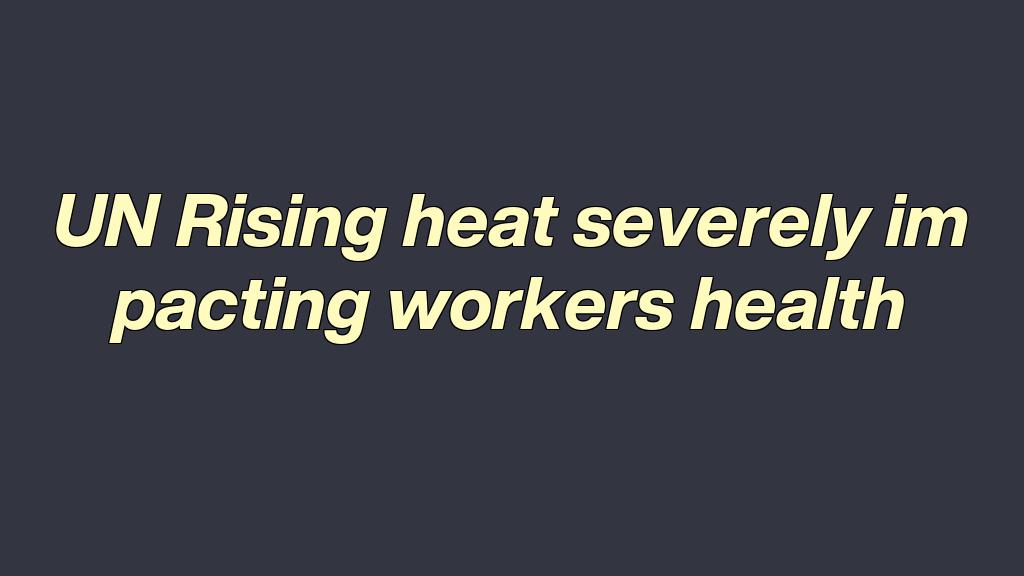GENEVA, Switzerland — Rising global temperatures are having an ever-worsening impact on the health and productivity of workers, the United Nations said on Friday, urging immediate action to tackle the dangers of heat stress.
Extreme heat is posing growing challenges in the workplace, the UN’s health and climate agencies said, as they issued guidance for governments, employers and health authorities to mitigate the risks.
“Immediate action is needed to address the worsening impact of heat stress on workers worldwide,” they said.
Many workers are regularly exposed to dangerous heat conditions, the World Health Organization (WHO) and the World Meteorological Organization (WMO) said.
But the WHO and WMO said the frequency and intensity of those extreme heat events had risen sharply, increasing the risks for both outdoor and indoor workers alike.
Manual workers in sectors such as agriculture, construction and fisheries are hit particularly hard, they said in a report.
The agencies said worker productivity dropped by 2 to 3 percent for every degree above 20 degrees Celsius.
The related health risks include heatstroke, dehydration, kidney dysfunction and neurological disorders.
Economic factor
“Occupational heat stress has become a global societal challenge, which is no longer confined to countries located close to the Equator,” said WMO Deputy Secretary-General Ko Barrett. “Protection of workers from extreme heat is not just a health imperative but an economic necessity.”
The agencies called for occupational heat action plans, tailored to specific industries and regions.
The guidance drew on findings by the UN’s International Labor Organization (ILO), highlighting that more than 2.4 billion workers are exposed to excessive heat globally — 71 percent of the world’s working population.
It results in more than 22.85 million occupational injuries each year and almost 19,000 fatalities.

“Investing in effective, preventive and protective strategies would save the world several billion dollars every single year,” said Joaquim Pintado Nunes, the ILO’s chief of occupational safety and health and the working environment.
“Without bold, coordinated action, heat stress will become one of the most devastating occupational hazards of our time, leading to a significant loss of life and productivity,” he added.
Adapt or die
UN: Rising heat 'severely' impacting workers' health
The guidance called for a focus on middle-aged and older workers, and those with chronic health conditions or lower physical fitness who would be more susceptible to heat stress.
It said workers, trade unions, health experts and local authorities should work together to come up with heat-health strategies that would then be widely supported.
Heat stress symptoms, it added, are often misdiagnosed, with people failing to recognize the signs., This news data comes from:http://www.705-888.com
The last WHO technical report and guidance on workplace heat stress dates from 1969, “when the world looked very different in terms of climate change,” said the agency’s environment chief, Ruediger Krech.
“What’s changed is the severity,” he added, with each of the past 10 years being in the warmest 10 ever recorded.
Johan Stander, senior director of the WMO’s services division said: “We must face up to the future of extreme heat. It’s a reality for many: a case of adapt or die.”
- Five killed in New York state tourist bus crash
- France seized by fears of new political crisis
- Thailand's Parliament to vote Friday for a new prime minister
- Cusi charged over Malampaya deal
- No winner in lotto draws for Aug 30
- Marcos says commission on DPWH anomalies to be finalized 'very soon,' mum on Magalong participation
- Floods kill over 30 in Indian-controlled Kashmir, displace 150,000 in east Pakistan
- NKorea's Kim tells Xi hopes to 'steadily develop' ties – KCNA
- Private groups back DHSUD chief's anti-corruption policy
- Israel ups pressure on Gaza City as Trump talks post-war plan